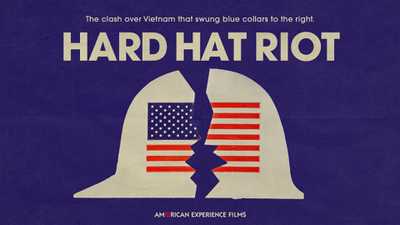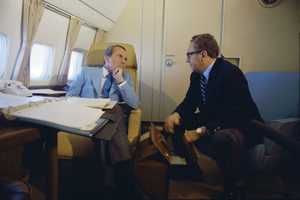Kissinger Q&A

Writer/Producer Barak Goodman is co-founder and a principal producer, director, and writer at Ark Media. Over a career spanning more than two decades, his films have won multiple Peabody, Emmy, Writers Guild Awards, DuPont-Columbia Awards, and the RFK Journalism Prize, and been nominated for an Oscar. His films for American Experience include Woodstock, marking the 50th anniversary of the iconic music festival; Clinton, Oklahoma City, Ruby Ridge, My Lai, and more. Here, Goodman answers our audience questions about Kissinger and its subject.
How did Kissinger juggle his dual roles of Special Assistant for National Security and Secretary of State?
The first answer is that he had legendary energy and stamina. Though he didn’t look like a long-distance athlete, he certainly behaved like one. We heard stories from much younger aides and reporters assigned to cover him about how they would have to collapse in bed and sleep for days after one of his “shuttle diplomacy” missions, or the lead-up to an important policy decision in which he’d demand revision after revision of their memos. The second answer, though, is more subtle. By the time he was named Secretary of State in the latter part of the Nixon administration, he’d largely “tamed” the State Department — made it mostly a bureaucracy there to administer the decisions of the NSC, rather than create policy itself. Thus, when he became Secretary of State, he was merely adding an administrative role, rather than trying to straddle two policy roles.
When did Kissinger know that the war in Vietnam was lost?
It’s interesting: as the film suggests, Kissinger felt the war was lost as early as 1965 when he made the first of several trips to Vietnam before he joined the Nixon administration. He didn’t doubt that the US had to exit Vietnam, the question was how? Why, then, did it take four years after he came into office to achieve a peace settlement, at the cost of hundreds of thousands of additional American, Vietnamese, Laotian and Cambodian lives, not to mention untold treasure? That is one of the mysteries of the Nixon-Kissinger era. I think the answer is complex: neither man could stomach essentially an unconditional surrender, nor probably could most of the country — too much sunk cost. They also worried about the wider effects on our alliances across the world of abandoning South Vietnam. And most of all, they worried about the wider Cold War conflict in which we/they were engaged. Besides, how could it be that the North Vietnamese would not negotiate something that would satisfy both sides? Kissinger believed deeply in the power of diplomacy backed by force, and didn’t think it had been effectively exercised before him. He thought that once he got in the room with North Vietnamese negotiators, he could persuade them. This was one of the biggest and costliest miscalculations of his life. It took four painful years to realize the North Vietnamese were not playing the same Cold War chess game he was. They wanted to unify their country and nothing short of that was going to satisfy them.
How did he feel about never being called back into official government service?
Kissinger chafed at not being called back into service. He wanted to be a player, and managed to be one, until the very last day of his life. I think it’s fair to say that in terms of actual influence, he had more than most NSA’s or Secretaries of State long after he left office. His pronouncements were taken as oracular by a succession of foreign policy mavens and presidents, and his longevity attested to the respect the foreign policy establishment had for him. But he would have liked to have the trappings of office for sure. Power, much more than money or status, was his abiding obsession throughout his life.
How did you decide who to interview for this film and why?
First and foremost, we wanted to hear from the people closest to him, whether they revered him or reviled him (and there were plenty of both). So, his NSC staff (Roger Morris, Tony Lake, Mort Halperin, Winston Lord, Bob Hoskinson, etc), the journalists who covered him (Hedrick Smith, Sally Quinn), and so on.. Next we wanted to hear from those scholars who had studied him most deeply — again, wherever they might line up (Niall Ferguson, Tom Schwartz, etc). We wanted a robust debate to happen within the film, though of course we had our own conclusions we also wanted to present.
We received a number of comments about the use of illustrations and animations in the film. Why did you choose to go that route?
We knew that people would divide on the use of animation, they almost always do. But my thought was first that it would add some playfulness and humor to the generally very serious tone of the film. Secondly, it could subtly make some editorial points that the interviews alone might not convey; chiefly that there was a dangerous silliness to the cloak and dagger approach Kissinger often took. Most of our animations were about that, and adopting a sort of comic book aesthetic was meant to convey that sense of Pink Panther-esque absurdity, which actually had a real downside in terms of the real world. For example, was the secrecy surrounding the bombing of Cambodia really necessary? Shouldn’t he/Nixon have gone to the American people and made their case before expanding the war?
You touched on his relationships with his two wives—is there anything else you would like to have included about Ann or Nancy?
I do wish we could have made Ann and Nancy bigger characters. Both were remarkable women in their own way. Ann is a very private person and not much is known about her. Her son David told me she was quite politically progressive and disagreed with her husband on many issues, especially Vietnam. I would have liked to do more on the long relationship with Nancy. She is a remarkable person — apparently quite brilliant to go along with her striking looks. On first glance, it was an odd couple relationship — the statuesque New York society girl and the somewhat frumpy Harvard professor — but they had enormous respect for each other, political alignment, and enormous affection over a very long period.






